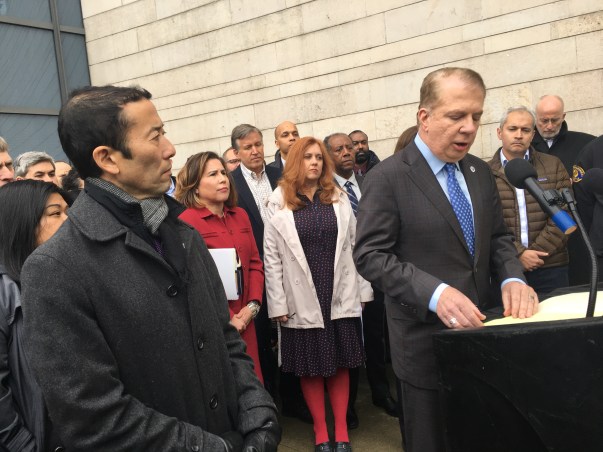At a hastily called press conference Wednesday afternoon, Mayor Ed Murray declared he was “willing to lose every single penny” of federal funding that flows to Seattle in order to protect undocumented immigrants and refugees living in the city. Murray’s remarks came after President Donald Trump signed an executive order declaring that the federal government would withhold all federal funding from so-called “sanctuary cities”—a catchall term for cities, like Seattle, that refuse to cooperate with federal immigration agents by handing undocumented immigrants over for deportation.
Calling January 27, 2017 “the darkest day in immigration history since the internment of Japanese-Americans,” Murray said, “We will not, as we did in World War II, allow our police to become deputies of the federal government and round up immigrants in this city.” The city argues that any federal order requiring SPD to ask demand detainees’ immigration status would violate the 10th Amendment, which states that the federal government can’t force states to enforce any federal law.
The city stands to lose as much as $85 million in federal funding if Trump makes good on his threat and pulls every federal grant the city receives. In that scenario, the department that would be hardest hit is the Human Services Department, followed by the Seattle Department of Transportation and the Office of Housing. Anticipating that worst-case scenario, Murray said, he has asked every department to “reprioritize” its budget for a post-federal-funding future; specifically, he said, “I’m going to give them a number and ask them to cut their budget to that number.” When I asked whether he would order all departments to cut a certain percentage from their budgets, as previous mayors have done when economic downturns necessitated major cuts, Murray said, “I need more than a couple of hours [after the executive order was released] to answer your question.”
Turning to legal remedies, Murray said the city “is prepared to take any legal avenues that we need to to ensure that immigrants, regardless of their documentation, remain in this city and that the United States Constitution is not violated.” He also suggested what form that legal action might take, noting that the federal government is supposed to prove there is a “nexus” between any funds they withhold and their reason for withholding it. That’s a potentially risky move, though, because it could leave grants the Seattle Police Department receives through the Department of Justice especially vulnerable to cuts, since police would be the ones refusing to follow federal orders to turn undocumented immigrants over to federal agents.
 City attorney Pete Holmes, who showed up to the press conference with a copy of the Constitution tucked in his inside jacket pocket, said he found it ironic that a “law and order” administration would specifically target funding for police. “[Federal] law enforcement funds help increase the security of the country,” Holmes told me before the press conference. “It’s difficult to match up. The prescribed remedies do exactly the opposite.”
City attorney Pete Holmes, who showed up to the press conference with a copy of the Constitution tucked in his inside jacket pocket, said he found it ironic that a “law and order” administration would specifically target funding for police. “[Federal] law enforcement funds help increase the security of the country,” Holmes told me before the press conference. “It’s difficult to match up. The prescribed remedies do exactly the opposite.”
Holmes said he’s “asking all the departments to identify all grants and federal funding” but declined to specify which departments stood to lose the most. “I’d rather not engage in shadowboxing these general assertions about grants,” he said. “I’d rather drill down on the specifics.”
Lisa Daugaard, head of the Public Defender Association, which works on police reform was in the audience during the mayor’s press conference. Afterward, she suggested another potential avenue for legal action in the fact that the executive order gives the US attorney general “general, limitless jurisdiction” to define which cities are “sanctuary cities” and punish them accordingly. There’s no official definition of a “sanctuary city,” but the Trump Administration appears to be targeting large cities whose voters did not support him, such as New York and Chicago. By defining sanctuary cities “arbitrarily,” Daugaard argues, Trump and his attorney general are overstepping their authority under federal law and opening themselves up to a legal challenge by local jurisdictions.
“Federal agencies, and the attorney general as an agency, can’t arbitrarily choose to take action or not take action because they don’t like the lawful choices cities make,” Daugaard says. “The problem with the executive order is it gives the attorney general limitless authority, without any standards, to make arbitrary decisions about who loses federal funding. That’s the poison pill.”
Daugaard holds out hope—if you can call it that—that Trump will be forced to back down on enforcing the order when his own supporters in the hundreds of jurisdictions that have declared themselves sanctuary cities or counties start feeling the impact the loss of millions of federal dollars will have on their communities. “It’s unlawful, but it’s also untenable,” Daugaard says. “It will be devastating to hundreds of cities and counties, which will lead to a huge loss of support and momentum” for the administration.



3 thoughts on ““Willing to Lose Every Single Penny”: Mayor Doubles Down on Seattle’s Sanctuary Status”
Comments are closed.